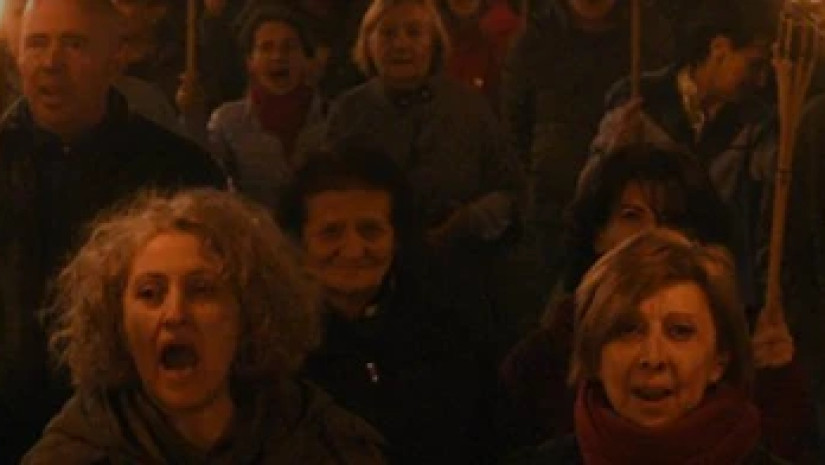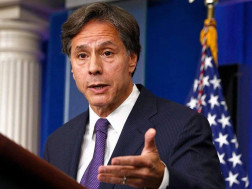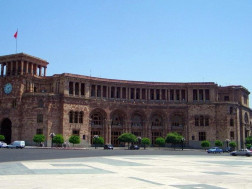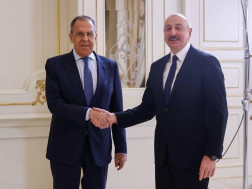Russia’s invasion of Ukraine has caused the resolution of the Nagorno-Karabakh conflict between Armenia and Azerbaijan to drift away from Russia’s mediation toward that of the West. Now Russian peacekeepers in the disputed Nagorno-Karabakh region appear to be in a catch-22 situation. Azerbaijan is becoming increasingly emboldened by the Kremlin’s weakness, with the country’s pro-government media now describing the peacekeepers as “occupiers,” but Moscow’s hands are tied: any response will only make its situation worse.
Since December 12, Azeri eco-activists have blocked the Lachin Corridor, stopping traffic along the only road connecting Nagorno-Karabakh with Armenia. Just six months ago, Baku did not contest the special status of the Lachin Corridor, or the right of Armenians to travel unimpeded along it. On the contrary, the Azeri government built a new road well ahead of schedule, bypassing settlements in the Lachin region that had come under Azerbaijan’s control.
The trilateral agreement of November 9, 2020 that put a stop to the Second Karabakh War states that “Azerbaijan guarantees safe travel along the Lachin Corridor in both directions for civilians, means of transport, and cargo.” Yet Baku is now hinting that the agreement has been violated so many times that its patience has run out.
Azerbaijan’s official complaint is that the Armenians are causing environmental damage to territory that is soon to be resettled by Azeris by continuing to operate polluting metals mines in parts of Nagorno-Karabakh still controlled by the Armenians. Nothing has in fact changed for the last year, but back then, Azerbaijan was apparently not concerned.
Equally, until the last few weeks, no one disputed the right of the Russian peacekeepers to decide who could travel to the region’s main city, Stepanakert, and who could not. Now Azeri journalists are trying to walk past the peacekeepers’ checkpoints along the Lachin Corridor, arguing that they are citizens of Azerbaijan and are simply exercising their unconditional right to move around the territory of their country.
The Lachin Corridor was first blocked by Azeri nationals on December 3. On that occasion, the problem was resolved relatively swiftly when the commander of Russia’s peacekeeping mission, General Andrei Volkov, agreed with Azerbaijani government officials that Baku would be able to carry out inspections at the Karabakh mines. But on December 10, when Azeri environmentalists tried to visit one of the mines, they were prevented from doing so by Armenians, whom the peacekeepers failed to disperse.
On December 12, Baku decided to show that completely blocking the Lachin Corridor was not just an empty threat. The environmental protesters—who certainly would not be there without Baku’s blessing—insist that they will allow any civilian vehicle to pass through. But there is no way of testing this in practice, because the peacekeepers have been forced to close the road entirely: if an Armenian vehicle crashes into a crowd of Azeris, that will certainly inflame tensions even further.
The latest developments are in part a consequence of the fact that entry into the part of Nagorno-Karabakh controlled by the Armenians remains unregulated, and is effectively at the discretion of the peacekeepers, who don’t always have a uniform approach. Officially, any citizen of Armenia—or even Armenians traveling on the passports of other nations—can pass the checkpoints. But when a group of Armenian opposition parliamentary deputies tried to pass, they were turned back, much to Yerevan’s annoyance.
Now that the road is blocked by Azeri activists, it’s unlikely that a constructive way of regulating travel along the corridor can be found. Nor is it clear how Russian peacekeepers can restore their authority in the current situation. Any attempt to break up the environmental protests will conclusively ruin relations between Moscow and Baku. The extension of the peacekeeping mandate after 2025 is already in serious doubt, and directly restraining Azeris on their own territory will put an end to it once and for all.
Instead, therefore, Moscow is choosing to do next to nothing. Since the Lachin Corridor has been blocked, Russian President Vladimir Putin has spoken to both Armenian Prime Minister Nikol Pashinyan and Azerbaijani President Ilhar Aliyev, but that has not defused the tension. On the contrary: on December 13, Azerbaijan also cut off the gas supply to Armenian-controlled Nagorno-Karabakh.
While Russian propaganda prefers to ignore what is going on in the Lachin Corridor, Azerbaijan’s media is propagating wild conspiracy theories, accusing the Russian peacekeepers of corruption and pro-Armenian bias, and even alleging that they are actually Armenians in disguise.
Baku would like to emerge from the current situation having at least established customs checkpoints at the entrance to Nagorno-Karabakh from the Armenian side and gained the opportunity for Azeri officials to visit the region under the protection of peacekeepers. If representatives from Azerbaijan’s Environment Ministry can start work in the region, that will already be a major success for Baku. Azerbaijan is also demanding that Russian peacekeepers adhere strictly to the commitment that Nagorno-Karabakh must inevitably come under the full control of Baku.
Such ambitious demands from Baku automatically push the Russian peacekeepers closer to Yerevan’s position of seeking to preserve the status quo, settle disputes behind the scenes, and for the Lachin Corridor to be open to everyone. Most importantly, the peacekeepers are reluctant to say that the Armenian administration in Stepanakert is not legitimate, because that instantly raises the question of which administration, then, is the legitimate one?
For now, Moscow is trying to weather the storm in the hope that all of this will just go away. But at some point it will have to have a serious conversation with Baku about reassessing the existing arrangements in Azerbaijan’s favor. The extent to which Russia and its peacekeepers lose face will be directly proportionate to how far the Azerbaijani side goes in tearing up the old rules.
This time, a compromise between Moscow and Baku will likely be found: the peacekeepers will agree to partially implement Azerbaijan’s new demands. But there will be no return to the way things were, just as there will be no status quo that suits Russia.
Given the situation on the frontlines in Ukraine, Moscow could do without the distraction of Nagorno-Karabakh, but it has no choice. How the conflict there develops now depends on Baku, and it is in Baku’s interests for the situation to change from day to day. After all, the more uncertain tomorrow looks for the Armenians, the more of them will leave Nagorno-Karabakh, without waiting to see what happens next.
Source: https://carnegieendowment.org/
















